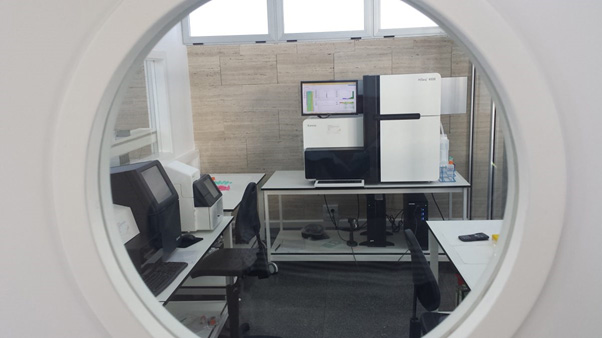Objective
The central objective of the mentioned Massive Genomic Data Analysis Service is the development of research projects and the deployment of services aimed at bringing the implementation of Personalized Medicine to Tenerife and, by extension, to the entire Canary Islands territory. This service is being structured through the creation of a division within ITER, the Genomics Division, in three areas:
- in the hiring of personnel with the appropriate professional profile;
- in the setup of a molecular biology laboratory adapted for massive DNA sequencing;
- and in the adaptation of the high-performance computing infrastructure of teideHPC for the use of bioinformatics data processing tools.
Key actions and partners
Currently, the Massive Genomic Data Analysis Service is developing the necessary protocols for routine massive sequencing of complete genomes and exomes (the protein-coding part of the genome). In January 2017, the first advances made by this new division of ITER were made public: the sequencing of the first 10 complete human genomes carried out for the first time in the Canary Islands, under conditions of quality and reproducibility.
Once the initial installation and tuning phase of the aforementioned technologies is completed, the ITER human team can expand its activity by developing initiatives not only through the participation of the Massive Genomic Data Analysis Service and the dissemination of its results but also through the organization and participation in activities to promote education, training, research, development, and innovation in Biotechnology. The initial pilot project started in 2016 thanks to the capital expansion of ITER authorized by the Insular Cabildo of Tenerife has transformed into a viable project for the future, illustrated by the scientific and research activity demonstrated by the human group behind it. In this regard, it is worth noting that the initial activity channeled through the pilot project has been reflected in the scientific contribution in various national and international forums of relevance.
All this activity is positioning Tenerife and the Canary Islands on the national and global map of centers of excellence that promote research related to Personalized Medicine.
It is also worth noting that all the activity promoted by the Insular Cabildo of Tenerife has anticipated recent initiatives that stand out at the national level. We emphasize the evident concordance with the Proposal of Recommendations for a State Strategy for Personalized Precision Medicine (PPM), elaborated in 2017 by a prestigious team of experts in different fields of knowledge linked to Biotechnology through the Roche Institute Foundation. The mentioned study stands out, specifically in the proposal of recommendations called “Area 6, on Research and Innovation (R&I),” the consensus that is beginning to exist in our country for the design and development of various PPM strategies, among which the “promotion of studies characterizing genetic variability in a healthy population (healthy phenotype)” stands out. This concordance is also supported by the activity of the Parliamentary Committee on Precision Medicine in the Spanish Senate during the 2017-2018 biennium, whose objective is to analyze the future of PPM and its impact on the National Health System and its financing.
Source of financing
Tenerife 2030 Area: Innovation, Education, Culture, and Sports. Cabildo Insular de Tenerife.
This initiative is co-financed by the MEDI-FDCAN 2016-2025 Program and is included within the Insular Development Strategic Framework (MEDI) 2016-2025 of the Cabildo Insular de Tenerife.

Implementation period
January 2018 – December 2021


